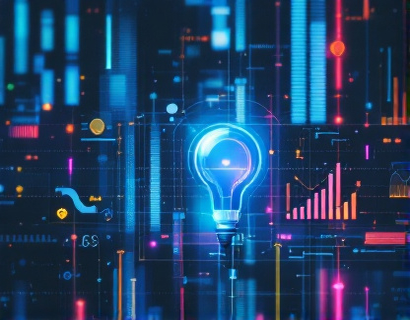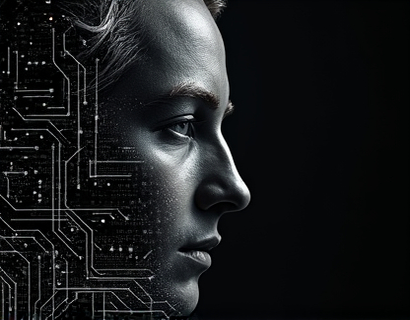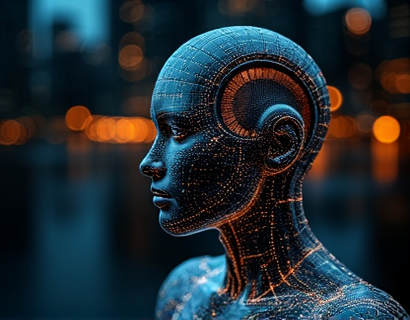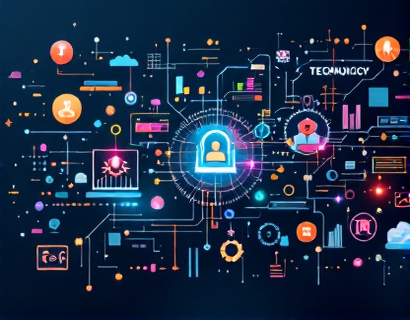Crypto AI Synergy: Elevating Digital Transformation with Blockchain and Machine Learning for Next-Gen Solutions
The intersection of blockchain technology and artificial intelligence (AI) is giving birth to a new era of digital transformation. This synergy, often referred to as Crypto AI, is revolutionizing the way businesses operate and innovate. By combining the immutable and transparent nature of blockchain with the intelligent and adaptive capabilities of AI, organizations can unlock unprecedented levels of efficiency, security, and innovation. This article delves into the profound impact of this technological convergence, offering a comprehensive roadmap for leaders to harness its potential and stay ahead in the blockchain revolution.
To understand the significance of Crypto AI, it's essential to first grasp the individual capabilities of blockchain and AI. Blockchain technology, at its core, is a decentralized ledger that records transactions across multiple computers in a way that ensures security, transparency, and immutability. This technology has been most famously associated with cryptocurrencies like Bitcoin and Ethereum, but its applications extend far beyond digital currencies. Blockchain's strengths lie in its ability to provide trust without intermediaries, reduce fraud, and enhance data integrity.
On the other hand, AI encompasses a range of technologies including machine learning, natural language processing, and computer vision. AI systems can analyze vast amounts of data, identify patterns, make predictions, and automate complex tasks. The combination of these two technologies creates a powerful toolset for businesses looking to innovate and stay competitive in a rapidly evolving digital landscape.
The synergy between blockchain and AI is particularly potent in the realm of data management and security. Blockchain's decentralized and tamper-proof nature ensures that the data used to train AI models is reliable and secure. This is crucial because the quality of AI outcomes is directly tied to the quality of the data. By using blockchain to manage and verify data, organizations can build more robust and trustworthy AI systems. For instance, in supply chain management, blockchain can provide a transparent and immutable record of product origins and movements, while AI can optimize logistics and predict demand with high accuracy.
Another area where Crypto AI shines is in the domain of smart contracts. Smart contracts are self-executing contracts with the terms of the agreement directly written into code. When combined with AI, smart contracts can become even more dynamic and intelligent. For example, AI can be used to analyze real-time data and automatically trigger smart contract actions based on predefined conditions. This not only streamlines processes but also reduces the need for manual intervention and human error.
In the financial sector, the integration of blockchain and AI is transforming traditional banking and finance. Blockchain provides a secure and transparent platform for transactions, while AI enhances risk management and fraud detection. AI algorithms can analyze transaction patterns and identify anomalies in real-time, alerting financial institutions to potential fraudulent activities. This combination not only improves security but also enhances customer experience by enabling faster and more accurate transactions.
The healthcare industry is another sector that stands to benefit significantly from Crypto AI. Patient data is highly sensitive and requires stringent security measures. Blockchain ensures that patient data is stored securely and can be shared seamlessly between healthcare providers while maintaining patient privacy. AI, on the other hand, can analyze vast amounts of medical data to identify trends, predict disease outbreaks, and personalize treatment plans. The synergy of these technologies can lead to more efficient, secure, and personalized healthcare services.
In the realm of Internet of Things (IoT), blockchain and AI are working together to create more secure and efficient connected devices. IoT devices generate massive amounts of data, which can be processed and analyzed using AI to derive actionable insights. Blockchain ensures that this data is secure and tamper-proof, preventing unauthorized access and manipulation. For example, in smart cities, IoT devices can monitor traffic, energy usage, and environmental conditions, with blockchain providing a secure ledger for data storage and AI optimizing resource allocation and urban planning.
To fully leverage the potential of Crypto AI, organizations need to adopt a strategic approach. Here are some key steps leaders can take to integrate these technologies effectively:
1. Assess Current Infrastructure and Needs
The first step is to conduct a thorough assessment of the organization's current technology infrastructure and identify areas where blockchain and AI can add value. This involves understanding the specific challenges and opportunities within different business functions. For instance, a company in the supply chain industry might focus on improving transparency and efficiency, while a financial institution might prioritize security and fraud prevention.
It's crucial to involve stakeholders from various departments, including IT, finance, and operations, to ensure a comprehensive understanding of the organization's needs. This collaborative approach helps in identifying the most impactful use cases for Crypto AI.
2. Build a Skilled Team
Implementing blockchain and AI requires a team with a unique skill set. Leaders should seek out professionals with expertise in both blockchain development and AI algorithms. This team should be capable of designing, developing, and maintaining the integrated systems. Additionally, continuous learning and upskilling are essential as these technologies are rapidly evolving.
Consider partnering with universities, research institutions, or tech consultancies to access a pool of talent and stay updated on the latest advancements. Internal training programs and workshops can also help in building a knowledgeable in-house team.
3. Pilot Projects and Gradual Implementation
Rather than attempting a full-scale implementation right away, organizations should start with pilot projects to test the waters. Pilot projects allow for the exploration of specific use cases in a controlled environment, helping to identify potential challenges and refine approaches before a broader rollout.
For example, a retail company might begin by using blockchain to track product authenticity and AI to optimize inventory management in a single store. Success in this pilot can then serve as a blueprint for expanding to other locations and integrating more complex AI features.
4. Ensure Data Quality and Security
Data is the lifeblood of AI, and its quality directly impacts the performance of AI models. In a blockchain-AI ecosystem, ensuring data integrity and security is paramount. Organizations should implement robust data governance policies and use blockchain to create a secure and transparent data management system.
Regular audits and compliance checks are necessary to maintain data quality and security. Additionally, leveraging advanced encryption techniques and zero-knowledge proofs can further enhance data privacy and security.
5. Foster a Culture of Innovation
Embracing Crypto AI requires a cultural shift within the organization. Leaders should foster a culture that encourages experimentation, risk-taking, and continuous learning. Employees should be empowered to explore new ideas and collaborate across departments to drive innovation.
Organizing hackathons, innovation labs, and cross-functional teams can stimulate creativity and accelerate the development of new solutions. Recognizing and rewarding innovative efforts can further motivate employees to contribute to the organization's technological advancement.
6. Stay Informed and Adapt
The fields of blockchain and AI are rapidly evolving, with new developments and applications emerging regularly. Leaders must stay informed about the latest trends, research, and regulatory changes to make informed decisions and stay ahead of the curve.
Subscribing to industry publications, attending conferences, and participating in relevant communities can provide valuable insights and networking opportunities. Being adaptable and willing to pivot strategies based on new information is crucial for long-term success.
In conclusion, the synergy between blockchain and AI represents a transformative force in the digital landscape. By leveraging the strengths of both technologies, organizations can achieve higher levels of efficiency, security, and innovation. The roadmap outlined above provides a structured approach for leaders to harness the power of Crypto AI and drive their businesses into the next generation of digital transformation.










































